



For a single day, writer-director-producer Abhishek Chaubey saunters in at the 2025 Cinévesture International Film Festival in Chandigarh. After his session on “The Challenges of Making a Biopic”, he catches a pause at the lawns in the evening, away from the crowds.
Chaubey’s height could be daunting if not for his quiet presence, albeit not an unwelcoming one. The upper-caste north Indian is as aware as his films are of the environment they inhabit and the responses to the stimulus and triggers they stoke. It is the social fissures that draw the Ayodhya-born director to champion intersectionality — and myriad realities — through an ensemble cast, and criss-crossing subplots, in his films.
Last year, Chaubey’s whacky quest-for-power dark comedy series Killer Soup (Netflix) was an out-of-the-box streaming concept that caught audience attention. It starred paya soup, Manoj Bajpayee and Konkona Sensharma, whose debut film A Death in a Gunj (2016) was Chaubey’s first co-production along with Honey Trehan under their company MacGuffin Pictures. The latest that the company produced was Christo Tomy’s Urvashi-Parvathy starrer Malayalam film Ullozhukku.
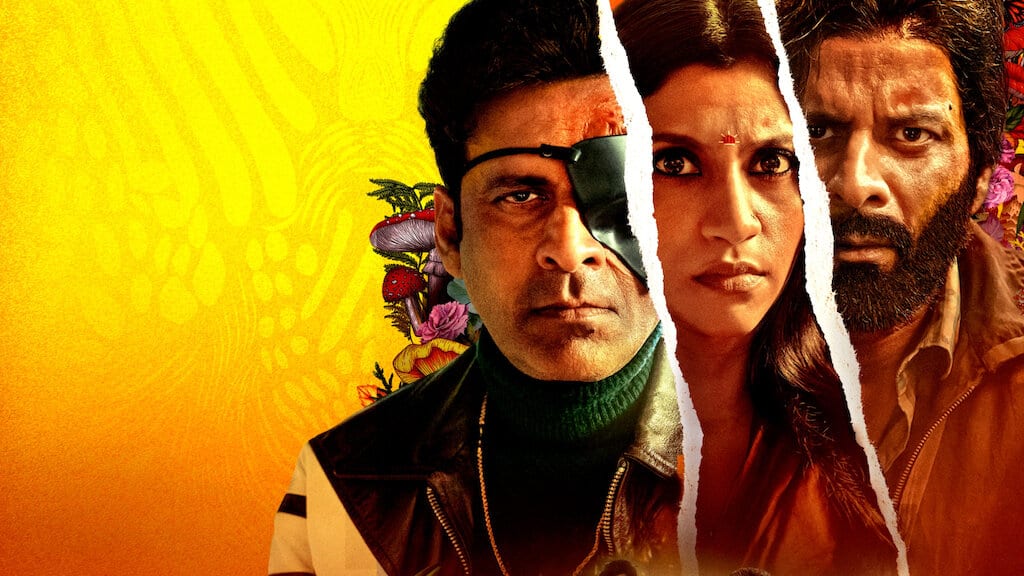 Killer Soup
Killer Soup
Chaubey spells it loud why he chose to become a producer as well, “All directors should directly control the budgets. I became a producer to make my own films. Earlier, as solely a director, I had no idea what the budget of the film was and how the money was being spent. Directors should be directly involved with the money and control how that money is being spent. That’s the only way to make the film. Creatively, too, a lot more windows open up,” he says.
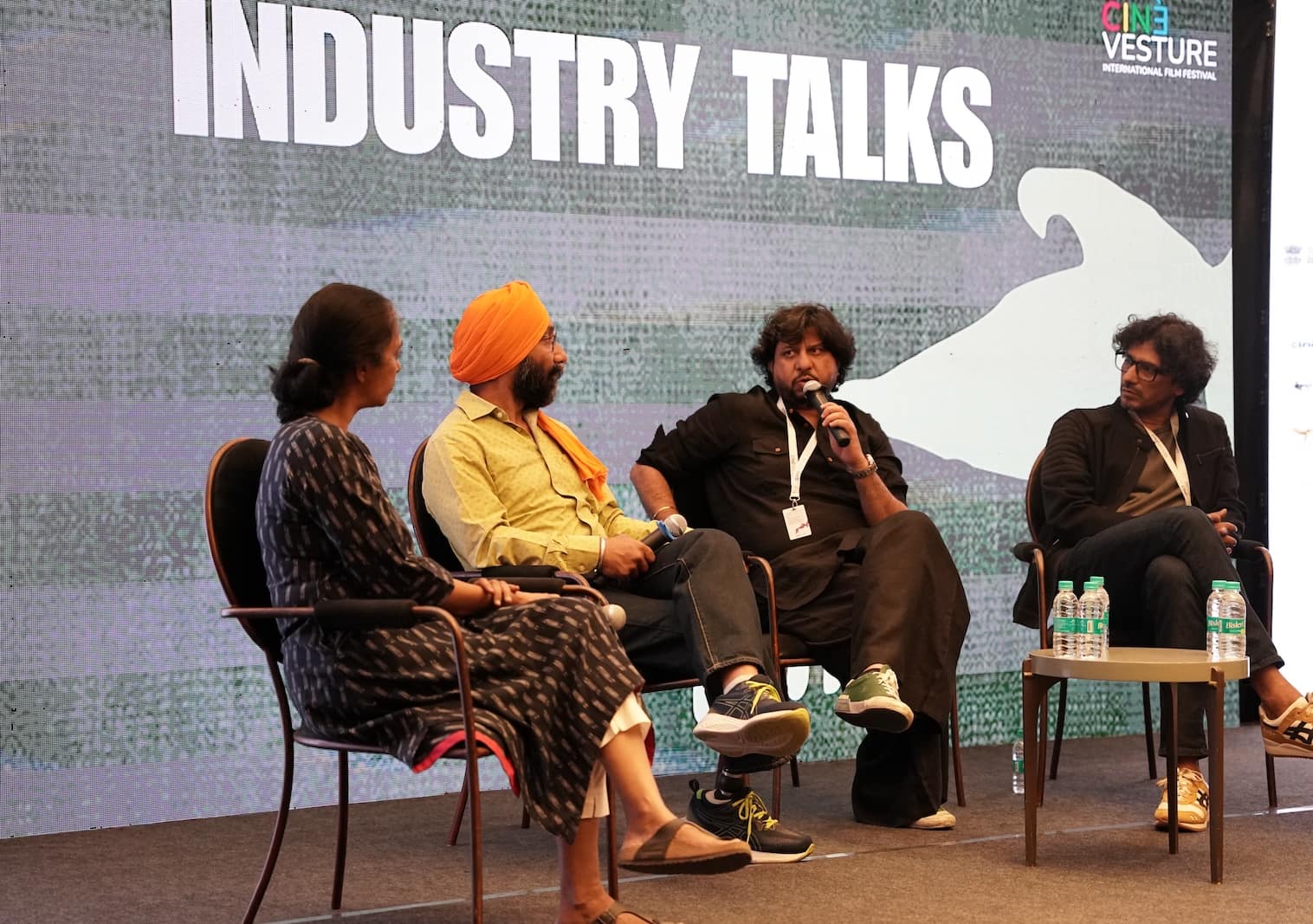 (From right) Director-producer Abhishek Chaubey, directro-producer Honey Trehan, Major DP Singh (Retd) speaking at the session 'The challenges of making a biopic' at the recent 2nd Cinévesture International Film Festival, in Chandigarh.
(From right) Director-producer Abhishek Chaubey, directro-producer Honey Trehan, Major DP Singh (Retd) speaking at the session 'The challenges of making a biopic' at the recent 2nd Cinévesture International Film Festival, in Chandigarh.
Chaubey is co-producing Honey Trehan’s The Blade Runner along with Chirag and Varun Bajaj. The Hindi-Punjabi biopic will train its lens on Kargil War hero Major DP Singh (Retd), India’s first blade runner, who defied death and systemic injustice, lost a leg and became India’s first amputee marathon runner as well as Asia’s first solo skydiver among persons with disabilities.
Of course, together Trehan and Chaubey run a production company, so, they will have each other’s back. But, also, he says, “it (Blade Runner) is a good subject, a very inspirational story.” Chaubey and Trehan both don’t care what happens in the market. “That’s the best way to be in this time, because there are a lot of distractions. At least, be honest with yourself. Our focus is that we make what we like,” says Chaubey, as Trehan at the biopic talk session said, “filmmakers are not criminals.” His Diljit Dosanjh film Punjab ’95 on the slain human rights activist Jaswant Singh Khalra, who investigated the disappearance and killing of Sikh youths during the 1984-94 Punjab insurgency, was removed from the Toronto International Film Festival (TIFF) 2023 and the film’s theatrical release this February has been postponed, as the CBFC has demanded 120 cuts, including the real name of the protagonist. Trehan and his producer Ronnie Screwvala won’t go gently into the night. Trehan said he doesn't understand the ban given that “the film has been made in line with legal documents of the Supreme Court”. He will next make, alongside Raat Akeli Hai 2, a biopic on the legendary Punjabi poet Shiv Kumar Batalvi. While Chaubey will make the biopic of hockey legend Major Dhyan Chand, to be produced by Screwvala’s RSVP Movies.
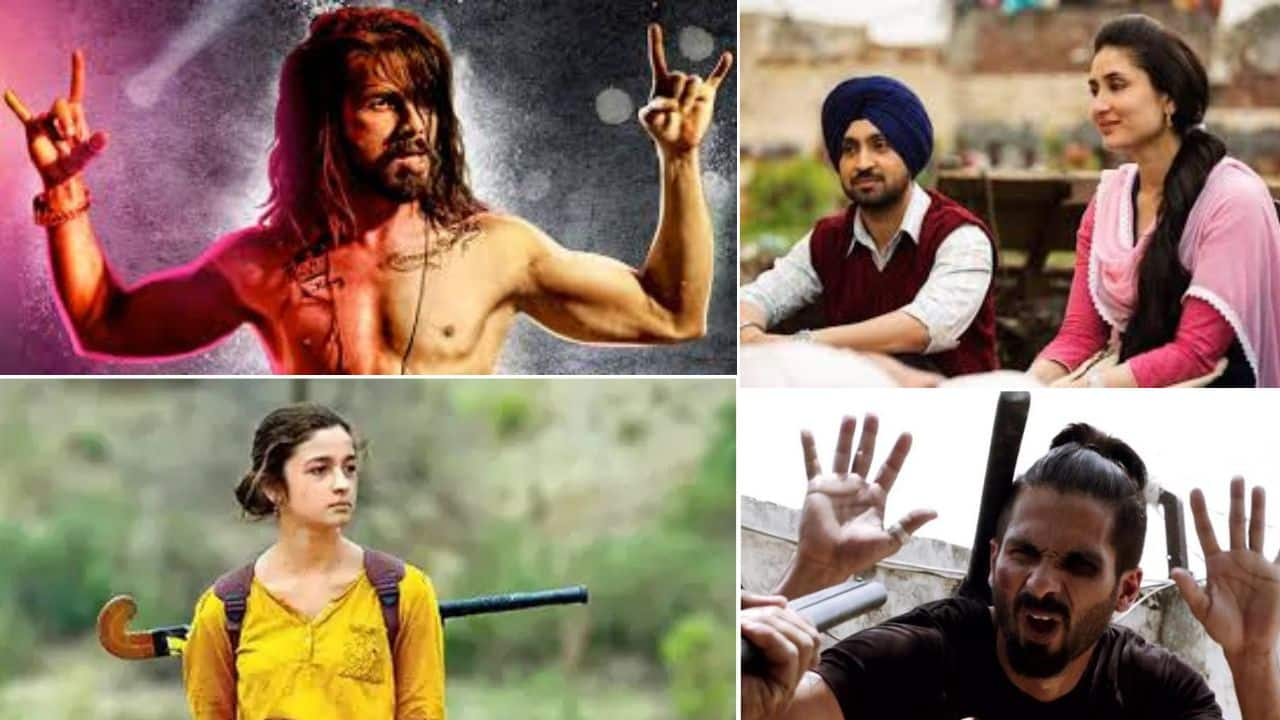 Stills from Udta Punjab.
Stills from Udta Punjab.
“It’s not easy doing a biopic in this country, because biopics are mostly hagiographical. That is boring. Also, if you’re doing anything that has anything remotely political in it, then that creates a problem. At any rate, in this country, as a filmmaker, you’ve got to have a lawyer. Every film that I’ve made, I’ve fought cases for. Biopics, even more so. Anybody can get up and do something. You have to tread with caution. Udta Punjab (2016) case was quite famous, but with Sonchiriya (2019), too, a retired dacoit filed a case for wrongful representation,” he says. It is exasperating, concedes Chaubey but he exhorts filmmakers to “legally vet your script before you make it. To know the problem areas. If something can be removed from the script, without harming the nature of the film that you’re making, do it. But also stand up for what you’re not going to change. Filmmaking is painful,” he adds, “because we don’t really have protections as far as freedom of speech is concerned in our country, it creates problems. But that doesn’t mean we’re going to give up.”
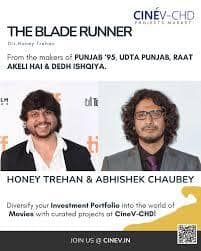
Is there a rebellion within that he channels through his writing? A quiet rebellion, he concurred in a previous interview. Against the prejudices of the conservative society he grew up in. Films, then, are a medium to channel that dissatisfaction, but aesthetically. And that can be done with visual design, which requires money, and that comes with the stars. The middle-of-the-road cinema of the 1970s-’80s is what Chaubey feels creatively closer to in his craft but the space for it now is over, he says.
The screenwriter-turned-director stands for a recent viral dialogue-turned-meme: writer baap hota hai! whether or not his works strike gold. He’s said in the past, that Paul Schrader is one of the greatest writers Hollywood has had and yet a Martin Scorsese film is a Martin Scorsese film, no matter who’s writing it. But unlike in the West, a lot of the times, Bollywood directors take screenwriting credit (‘collaborative writing’) for being a sounding board while developing a script.
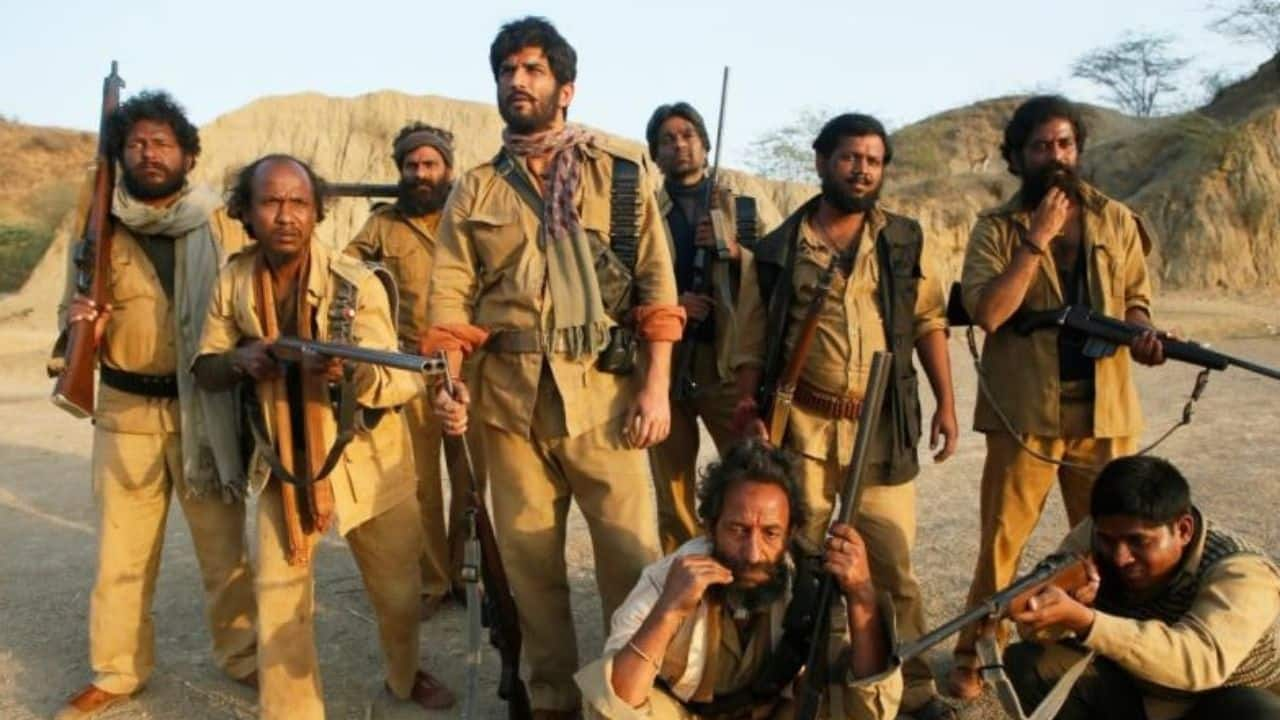 A still from Sonchiriya, starring Sushant Singh Rajput.
A still from Sonchiriya, starring Sushant Singh Rajput.
Chaubey, a literature student from Delhi University, began his film career by assisting Vishal Bhardwaj and co-writing with him, beginning with Makdee (2002). “At the start of my career, people used to say, ‘your film looks like Vishal ji’s films.’ But it’s natural. I’ve worked with Vishal Bhardwaj for 10 years. Obviously, my films would look like his than, say, Ashutosh Gowariker’s,” quips Chaubey, “It’s something I wear on my sleeve, I’m happy about it. And what’s wrong in that? Vishal ji’s a great director. He’s not a Kanti Shah, you know.”
With and without Vishal Bhardwaj, Chaubey has tasted both success and failure at the box-office. Successes as a co-writer on Kaminey; director on Ishqiya and Udta Punjab and failures with Omkara and Matru Ki Bijlee Ka Mandola (co-writer) and Sonchiriya (director). “Whether it’s a success or a failure, you still feel empty after you’ve done it. When you’re making a film, you’re wearing tinted glasses. Once done, you’ve taken them off and the world looks entirely different. But when something like Sonchiriya happens, it is durable. It has longevity. And whosoever talks about it, talks about it positively,” he says.
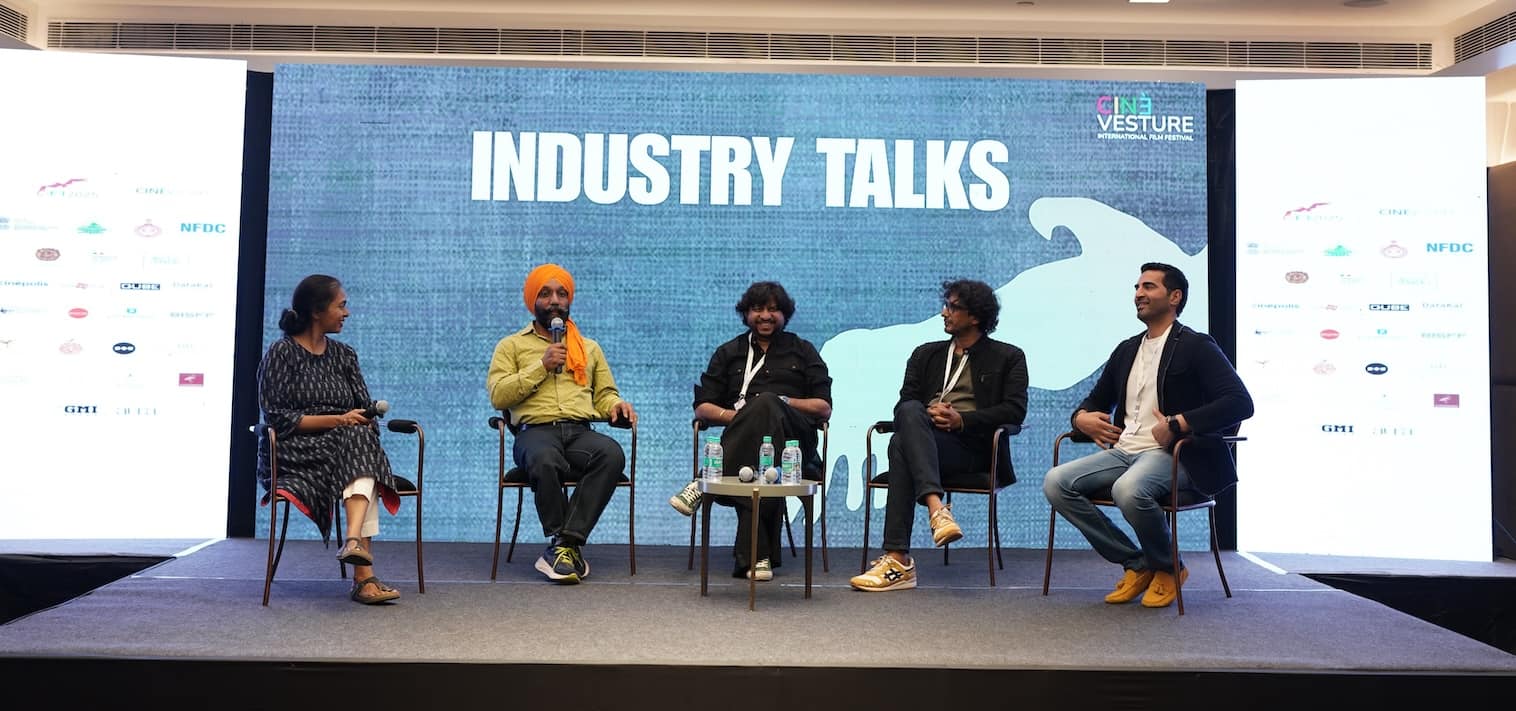 (From right) Producer Chirag Bajaj, director-producer Abhishek Chaubey, directro-producer Honey Trehan, Major DP Singh (Retd) speaking at the session 'The challenges of making a biopic' at the recent 2nd Cinévesture International Film Festival, in Chandigarh.
(From right) Producer Chirag Bajaj, director-producer Abhishek Chaubey, directro-producer Honey Trehan, Major DP Singh (Retd) speaking at the session 'The challenges of making a biopic' at the recent 2nd Cinévesture International Film Festival, in Chandigarh.
Audiences, now, are tired. Films have started to look like AI-generated factory products or stories that don’t go beyond Bandra. Reflecting on the crisis currently underway in Bollywood, Chaubey says, “The industry is going through a phase right now. But it is not dead.” Is the current moment the lowest point for the Hindi film industry, worse than the 1980s? “It’s the same,” he says, “There are good films happening now as well, like it did in the ’80s, too (Ardh Satya, Ijaazat, Arth, Arohan, Aakrosh). The ’80s were a bad phase for Hindi cinema, while South films were doing great and Hindi remakes were being made (like Sridevi-Jeetendra’s Himmatwala) — a lot like today — but the biggest challenge for Hindi cinema then was the advent of videos. Exactly the same thing was happening.”
Chaubey recalls he was a young boy when David Dhawan’s Govinda-Chunky Pandey comedy Aankhen (1993) released. The very same day, the film’s video cassette was sitting at his home. He saw it for 20 minutes and took his mother to to watch it in theatre. “Piracy was not such a big challenge as video. It nearly killed cinema,” he says, “Again, streaming has come. In fact, more than streaming, it’s the reels, on Instagram and TikTok, that are posing a huge challenge for cinema.”
 Vicky Kaushal will reportedly essay the role of the hockey legend Major Dhyan Chand (Retd) in the latter's biopic by Abhishek Chaubey.
Vicky Kaushal will reportedly essay the role of the hockey legend Major Dhyan Chand (Retd) in the latter's biopic by Abhishek Chaubey.
Chaubey has developed a series but is finding it hard to get attention from streaming platforms. “Streaming today is more conservative. They do not take risks. They are far more commercial. Just because they don’t have songs, doesn’t mean they’re not commercial,” he says. Besides, anything “controversial” in the subject is a big no-no. “Everything is based on algorithms. A bunch of youngsters who are heading streaming platforms have little knowledge, and come up and say: ‘It’s the 6th minute of the 4th scene.’ We have to do ridiculous things like that.”
Streamers had come in with a lot of hope to platform films which don’t find attention in the theatre space. “It’s gone to the other end now,” says Chaubey, “Technology changes but we all settle to our own level of mediocrity. When MTV came, we thought we were going to revolutionise Indian music. When Twitter came, I thought it’s going to bring people together.”
But movies won’t die, he reassures. “There is no phenomenon like watching movies, as a community experience bringing in hundreds of people, that can pose a challenge to it. There is no alternative to that. In the history of humanity, people have always gone in large numbers to watch a show. Whether a Kalidasa or Antigone play, to Greek theatre or gladiator shows. It’s human nature to do that,” he says.
Having said that, he also says that when it comes to the OTTs now, “there has to be rationalisation. You cannot have your films coming on the streamers just weeks or two months after the release. They stopped doing that in the past, stopped their films from being released on video. That’s how cinema came back. New stars came in. Shah Rukh Khans and Aamir Khans came. A new kind of cinema also came in. Now, streamers put up 10 full films in a week, we’ll have to stop films from coming to the streamers soon after the release. There will be a financial repercussion. Streamers won’t pay you as much as they are paying you now, but look at the effect of that. The middle-of-the-road cinema is over. It’s a phase, it will end.” Chaubey says the general perception that “it’s an OTT film” ruined the chances of a film like Superboys of Malegaon.
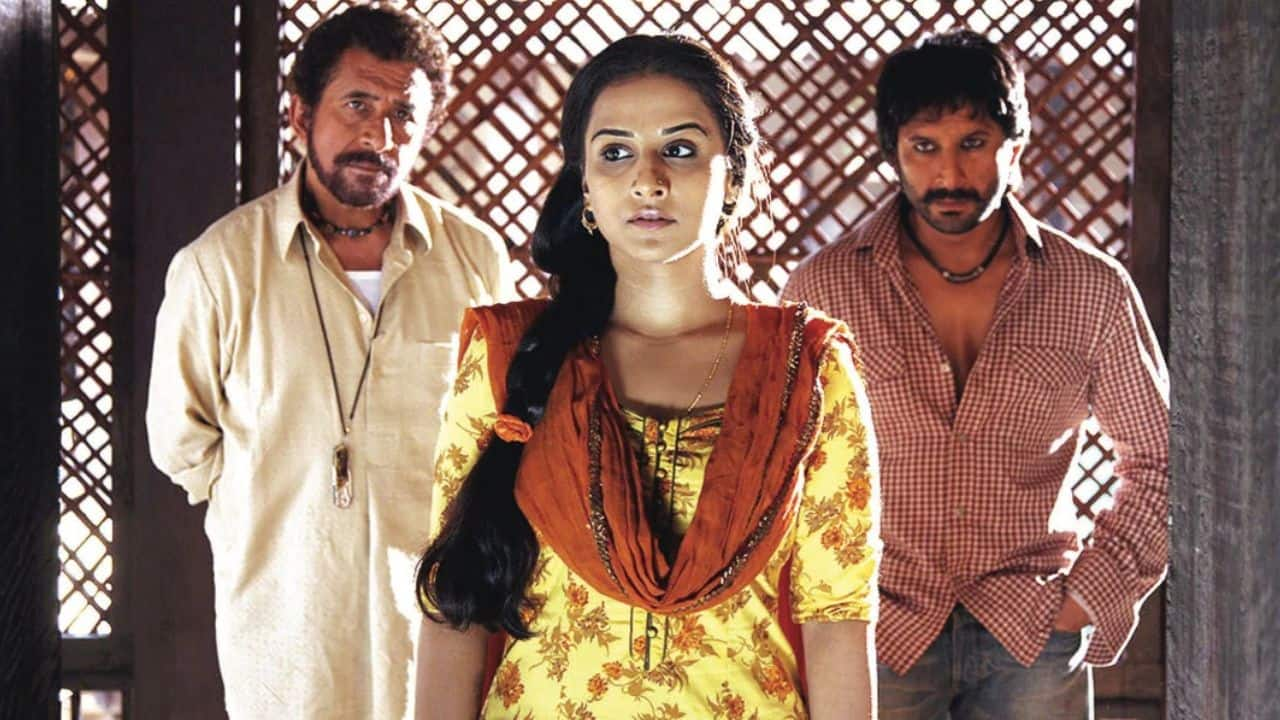 A still from Ishqiya, starring Naseeruddin Shah, Vidya Balan and Arshad Warsi.
A still from Ishqiya, starring Naseeruddin Shah, Vidya Balan and Arshad Warsi.
“I’ll tell you what the difference is,” quips Chaubey, “A film of this kind 15 years ago, even if it was a perceived flop, would still make a recovery. For instance, 15 years ago, Ishqiya came out. It was produced by Shemaroo, a very small production company. Ishqiya was a huge hit, it made money. In those days, even if a film was a hit, it would make Rs 8-10 crore. Now it doesn’t even make Rs 1 crore. The problem is that the films are not being watched, people are just not going to the movies, because of that perception ‘it will come on OTT’. Plus, after the arrival of multiplex, the expensive tickets pushed out the non-rich classes of audience. South India has capped ticket prices (Rs 200-250), they have also capped the publicity budget, which I think is very, very important. A giant production studio can spend Rs 25 crore for marketing a Salman Khan film but an independent filmmaker making a film with Adarsh Gourav or Shahana Goswami can’t. Because there is no visibility, they lose out on their audience.”
So, how do you do business in these times? “It’s hard. You’ve got to find a way though. Filmmakers are making films in Iran and China, so, it’s not that bad,” says Chaubey, who’s writing a period thriller, “set in the early 20th century but talks about contemporary social problems. That’s my way of doing it.”
Discover the latest Business News, Sensex, and Nifty updates. Obtain Personal Finance insights, tax queries, and expert opinions on Moneycontrol or download the Moneycontrol App to stay updated!
Find the best of Al News in one place, specially curated for you every weekend.
Stay on top of the latest tech trends and biggest startup news.